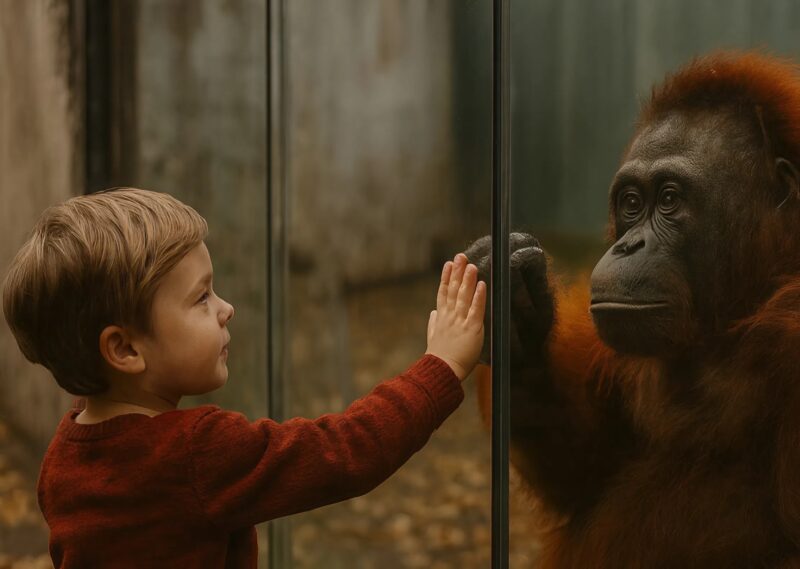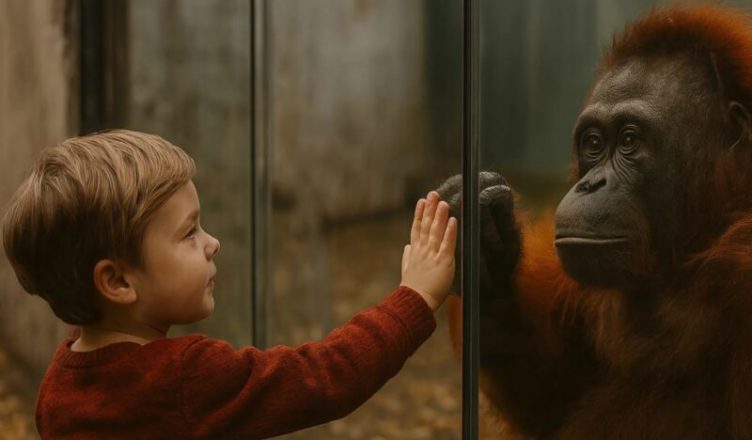The zookeeper reached them out of breath, as if he had run the entire length of the zoo:
“You don’t understand… this animal is under a special monitoring program. He wasn’t copying your child. He was reacting to a memory.”
The father stiffened.
“What do you mean?”
The keeper glanced around nervously, lowering his voice:
“This orangutan was rescued from an illegal private facility years ago. He lived in a concrete pit. The people who held him treated him brutally. When he sees a child standing at the glass… he reaches out not to play, but to seek help. It isn’t mimicry. It’s trauma.”

The cheerful atmosphere evaporated. A heavy silence settled over the crowd — thick, almost suffocating.
The mother held her son close, her voice trembling:
“But why did he place his hand exactly where my son did?”
The keeper looked at her with a pained expression.
“Because there used to be another little boy in that illegal place. A child who would cry and press his palm to the glass of the orangutan’s cage. For years, that was the only gentle moment he ever experienced. He remembers it all too well.”
A woman nearby swallowed hard and whispered:
“So he’s not playing… he’s remembering.”
The keeper nodded.
The boy, now calmer, raised his eyes again and looked at the orangutan with innocent sincerity:
“He’s not scary. He just looks lonely.”
As if understanding the child, the orangutan slowly sat back down, watching him with deep, weary eyes. There was no aggression, no wildness — only a sadness so human that several adults instinctively turned away.
The zookeeper spoke quietly:
“People think animals don’t feel things the way we do. That they forget quickly. But this orangutan… remembers everything.”
He turned toward the onlookers still holding their phones:
“So we always ask visitors to treat them with respect. They’re not here for entertainment.”
Before anyone could react, the boy gently lifted his hand again and placed it against the glass. The parents reached out to stop him — but too late.
The orangutan raised his hand too… slowly, deliberately… and pressed it to the same spot.
But this time, the gesture was different. There was no fear in it. No plea. Only a strange calm, as if the child’s simple kindness washed over something old and wounded inside the animal.
The silence shifted — no longer tense, but warm, almost reverent.
The father murmured:
“Maybe he doesn’t only remember the worst. Maybe he remembers kindness too.”
The keeper stared at the two hands — tiny and enormous — touching through the barrier:
“For him, that gesture means hope. It always has.”
No one filmed anymore. No one giggled or whispered. They simply watched.
The boy asked softly:
“Can I stay here just a little longer?”
His mother nodded.
And he stayed. And the orangutan stayed with him. Two beings from different worlds, connected by a single spot of glass — fragile, yet powerful.
Somewhere in that moment, people began to wonder: who was really behind the barrier — the animal… or us?
When the family finally walked away, the orangutan remained seated by the window, watching them disappear down the path. Not begging. Not distressed. Just quietly observing.
And for the first time in years, his eyes seemed lighter.
And the thick sheet of glass no longer looked like a prison wall…
but like a bridge between two wounded hearts, finally understood.
